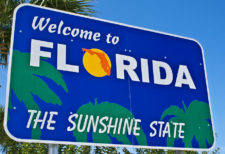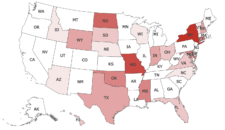 Last Thursday evening, the Florida legislature passed the most significant piece of public notice legislation in modern history.
Last Thursday evening, the Florida legislature passed the most significant piece of public notice legislation in modern history.
Sen. Ray Rodrigues’ (R-Fort Myers) SB402 makes Florida the first state in the country to significantly dilute the statutory requirement that notices must be published in print newspapers. But there’s a lot for the newspaper industry and residents of the state to like about the bill.
It’s certainly an improvement over the alternative, Rep. Randy Fine’s (R-Palm Bay) HB35, which would have moved public notice in the state from newspapers to government websites. Fine’s bill had passed the House by the time SB402 started picking up steam in the Senate.
In Indiana, future of notice arrives earlier than expected
 By the time Indiana’s 2020 legislative session had ended, the Hoosier State Press Association promised leadership in both chambers it would begin working on a proposal outlining what notice in the state might look like in a future in which print newspapers were no longer its primary vehicle. Like other state press groups, HSPA would prefer to keep public notice in newspapers, where they belong. But the newspaper group was bowing to reality, according to Executive Director Steve Key. After mostly holding off 91 bad public notice bills in the past 21 legislative sessions, even erstwhile supporters in the legislature were telling Key it was time to look to the future.
By the time Indiana’s 2020 legislative session had ended, the Hoosier State Press Association promised leadership in both chambers it would begin working on a proposal outlining what notice in the state might look like in a future in which print newspapers were no longer its primary vehicle. Like other state press groups, HSPA would prefer to keep public notice in newspapers, where they belong. But the newspaper group was bowing to reality, according to Executive Director Steve Key. After mostly holding off 91 bad public notice bills in the past 21 legislative sessions, even erstwhile supporters in the legislature were telling Key it was time to look to the future.
It’s House vs Senate in Florida
 Rep. Randy Fine’s (R-Palm Bay) House Bill 35 passed the Florida House on March 18 by a lopsided, almost party-line vote of 85-34. HB 35 would move all notice from newspapers to “publicly accessible websites and government access channels” — as a practical matter ending the long tradition of newspaper notice in the state.
Rep. Randy Fine’s (R-Palm Bay) House Bill 35 passed the Florida House on March 18 by a lopsided, almost party-line vote of 85-34. HB 35 would move all notice from newspapers to “publicly accessible websites and government access channels” — as a practical matter ending the long tradition of newspaper notice in the state.
But Rep. Fine’s bill was expected to pass the House, as it did in both 2019 and 2020. The question was always the Senate. Would HB35 stall in the upper chamber like it did the last two sessions?
After its bill passes, Guilford County loses interest in notifying citizens
 Two nearly identical public notice bills have been introduced in North Carolina. Both bills would allow multiple counties, and the municipalities within those counties, to adopt ordinances authorizing them to move their notices from newspapers to the county website. H35 would apply to 11 counties and HB51 would impact 13 others.
Two nearly identical public notice bills have been introduced in North Carolina. Both bills would allow multiple counties, and the municipalities within those counties, to adopt ordinances authorizing them to move their notices from newspapers to the county website. H35 would apply to 11 counties and HB51 would impact 13 others.
Their Republican sponsors (one co-sponsor is a Democrat) structured the bills so oddly to avoid the almost-certain veto of Democratic Governor Roy Cooper. In North Carolina, the governor can’t veto legislation filed as a “local bill”, and local bills are limited to 14 counties.
Bills eliminating newspaper notice introduced in 10 states
 PNRC is presently tracking about 60 different public notice bills introduced in 22 states so far in 2021. (We categorize all legislation that has any impact on public notice laws — even a minor impact — as public notice bills.)
PNRC is presently tracking about 60 different public notice bills introduced in 22 states so far in 2021. (We categorize all legislation that has any impact on public notice laws — even a minor impact — as public notice bills.)
Legislators in ten of those states have introduced bills that would move all or a significant percentage of notice from newspapers to government websites.
[See 2021 public notice legislation map]
Effort to end newspaper notice in Michigan falls short
 Two months ago, Michigan appeared to be in grave danger of moving its notices from newspapers to government websites.
Two months ago, Michigan appeared to be in grave danger of moving its notices from newspapers to government websites.
As one of his final acts as a state legislator, now-former Michigan House Speaker Lee Chatfield, R-Levering (pictured at right), led the move to eliminate newspaper notice in the state. Chatfield, who would be term-limited out of office on Dec. 31, had pursued that goal since he was elected to the House six years earlier. He made it one of his priorities for the brief lame-duck session that followed the Nov. 3 election.
Public notice in grave danger in Michigan
 Earlier the same week he visited the White House as part of Donald Trump’s ongoing effort to overturn the results of the presidential election, Michigan House Speaker Lee Chatfield, R-Levering (pictured at left) saw members of his caucus introduce a legislative package he hopes is the capstone of his half-decade project to move public notice in the state from newspapers to government websites.
Earlier the same week he visited the White House as part of Donald Trump’s ongoing effort to overturn the results of the presidential election, Michigan House Speaker Lee Chatfield, R-Levering (pictured at left) saw members of his caucus introduce a legislative package he hopes is the capstone of his half-decade project to move public notice in the state from newspapers to government websites.
It’s an unusual package of 105 separate bills that eliminate particular government notices — e.g., local government meetings, publication of new ordinances, etc. — spread throughout the state’s code. The bills are “tie-barred” to a single proposal, House Bill 6440, designed to serve as Michigan’s new general public notice statute. The tie-barred bills will only take effect if HB6440 passes.
Wyoming moves step closer to cutting newspaper notice
 Wyoming’s joint Corporations, Elections & Political Subdivisions Committee voted narrowly last month to sponsor legislation in the 2021 session that would allow cities and counties to move notices for meeting minutes and employee salaries from newspapers to their own websites. The committee advanced the bill on a 7-6 vote after hearing testimony that it would save cash-strapped local governments $400,000 in annual expenditures. Six Republicans and the only Democrat on the committee voted in favor of the bill.
Wyoming’s joint Corporations, Elections & Political Subdivisions Committee voted narrowly last month to sponsor legislation in the 2021 session that would allow cities and counties to move notices for meeting minutes and employee salaries from newspapers to their own websites. The committee advanced the bill on a 7-6 vote after hearing testimony that it would save cash-strapped local governments $400,000 in annual expenditures. Six Republicans and the only Democrat on the committee voted in favor of the bill.
Interim committees signal potential trouble ahead
 Many in the newspaper industry are wondering how public notice laws will fare in light of the fiscal crises precipitated in many states by the pandemic. Interim committee hearings last month in Wyoming and Arkansas suggest the answer may depend, at least in part, on the size and scale of each state’s budget deficit.
Many in the newspaper industry are wondering how public notice laws will fare in light of the fiscal crises precipitated in many states by the pandemic. Interim committee hearings last month in Wyoming and Arkansas suggest the answer may depend, at least in part, on the size and scale of each state’s budget deficit.
The Sept. 11 hearing in Cheyenne left Wyoming Press Association (WPA) Executive Director Darcie Hoffland in a state of heightened concern. By a 10-3 vote, the joint Corporations, Elections & Political Subdivisions Committee approved a motion to direct the Legislative Service Office to draft a bill that would move notices for meeting minutes and government-employee salaries from newspapers to local government websites. [CORRECTION: An earlier version of this story mistakenly stated the motion was “to introduce a bill next session” that would move the notices.]
Which public notice bill will become law in Kentucky?
 It’s been over a month since the Kentucky legislature passed two different, slightly conflicting public notice bills. There has been some confusion about which one will become law when the current statute sunsets on June 30, but that question appears to have been answered last week.
It’s been over a month since the Kentucky legislature passed two different, slightly conflicting public notice bills. There has been some confusion about which one will become law when the current statute sunsets on June 30, but that question appears to have been answered last week.
When we last left the Bluegrass State, HB195 had been vetoed by Gov. Andy Beshear (D) and HB351 had not. The governor later used his line-item veto to strike a number of provisions in HB351, a budget bill, including those relating to public notice. The Republican-dominated legislature ultimately overturned both of Beshear’s vetoes.
